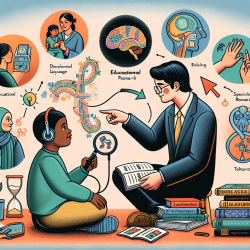Developmental Language Disorders (DLD) represent a significant challenge within the educational and therapeutic realms, affecting countless children's ability to communicate effectively. As educators and therapists strive to support these students, understanding the nuances of DLD and employing evidence-based strategies is crucial. The research article "Developmental Language Disorders: Part 1 - Definition" by Paula Tallal provides a foundational understanding and offers a springboard for further exploration and application in practice.
The complexity of language development necessitates a multifaceted approach to DLD. Tallal's research highlights the importance of early identification and the need for tailored interventions that address the specific areas of deficit within the language system. As practitioners, the call to action is clear: deepen our understanding of DLD and refine our strategies to meet each child's unique needs.
Implementing the outcomes of this research involves several key steps:
- Early Screening and Assessment: Utilize comprehensive assessment tools to identify children at risk for DLD as early as possible. Early detection is paramount in mitigating the long-term impacts of DLD.
- Individualized Intervention Plans: Develop intervention plans that are tailored to the specific needs of each child. This includes focusing on areas such as phonology, vocabulary development, syntax, and pragmatics, depending on the child's profile.
- Integration of Multimodal Approaches: Incorporate a variety of instructional strategies, including visual supports, technology-based interventions, and hands-on activities to enhance language learning.
- Parent and Caregiver Involvement: Engage parents and caregivers in the intervention process. Providing them with strategies to support language development at home is crucial for generalization and progress.
- Professional Collaboration: Collaborate with a multidisciplinary team, including speech-language pathologists, psychologists, and special educators, to ensure a comprehensive approach to addressing DLD.
Further research is essential to continue advancing our understanding and treatment of DLD. Areas for future exploration include the genetic and neurobiological underpinnings of DLD, the efficacy of specific intervention strategies, and the long-term outcomes for individuals with DLD. By fostering a culture of inquiry and evidence-based practice, we can enhance our ability to support children with DLD effectively.
In conclusion, the journey to improve outcomes for children with Developmental Language Disorders is ongoing. As practitioners, we must remain committed to learning, adapting, and implementing the most effective strategies. Let us take inspiration from Tallal's research to enhance our skills and make a meaningful difference in the lives of children with DLD. For those interested in delving deeper into this topic, I highly recommend reading the original research paper.
To read the original research paper, please follow this link: Developmental Language Disorders: Part 1 - Definition.










